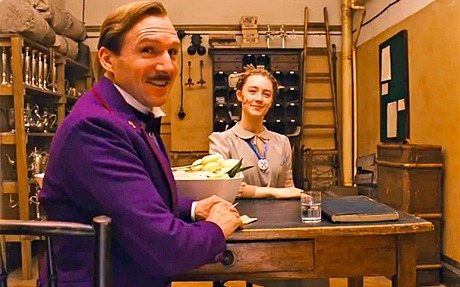A friend has seen Wes Anderson‘s Grand Budapest Hotel, which will debut at the 2014 Berlinale before opening stateside on 3.7 via Fox Searchlight. “Very Wessy from start to finish, but still very special, very touching and with a little more oomph than standard Anderson,” he begins. “Ralph Fiennes gives it a gravitas that Anderson’s movies have sometimes lacked. I’d rate it way above Moonrise Kingdom, which I quite liked also.

“Grand Budapest Hotel has all the playfulness and detached air that you’d expect from Anderson,” he explains, “but at the same time I felt he’s pushing himself a little more, perhaps not out of his comfort zone but at least he’s stretching within his realm.
“The specter of 1930s fascism looms over the whole affair. Most of the film plays in a fantasy Europe of the early 30’s, but Anderson addresses fascism and impending war without making a film about it. (The ‘S.S.’ is called ‘Z.Z.’ as in ‘zig-zag organization’, for example.) The film is a flashback within a flashback within a flashback — a strategy which gives Anderson the opportunity to show how the once grand hotel has gone to the dogs under communism over time.





















